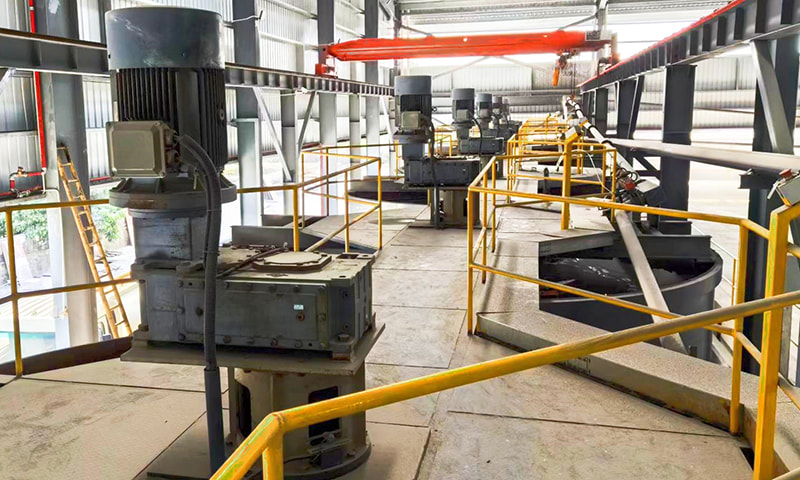Quality control of raw material end of lightweight block equipment
Light weight block machine's production quality depends first on the selection and control of raw materials. High-quality light aggregates are the basis for the production of high-quality lightweight blocks. Common raw materials include industrial waste such as fly ash, slag, expanded perlite and natural light aggregates. These raw materials must undergo strict inspection before entering the production line, including testing of key indicators such as particle grading, bulk density, and water absorption.
Modern light weight block machine is usually equipped with an automatic batching system, which accurately controls the ratio of various raw materials through a computer. The raw material silo should be equipped with a humidity monitoring device because fluctuations in the moisture content of the raw material will directly affect the quality of subsequent stirring processes. For production lines that adopt steam curing processes, special attention should be paid to the activity detection of cementitious materials (such as cement) to ensure that they can meet the requirements of rapid hardening.

Key control points in the production process of lightweight blocks
light weight block machine's core production processes include ingredients, stirring, molding, maintenance and other links, and strict quality control standards are required for each link. In the mixing process, the uniformity of the mixture directly affects the product strength. Modern equipment usually uses a two-axis forced mixer and monitors the stirring state in real time through sensors.
The forming stage is the most critical link in quality control. Light weight block machine parameters such as molding pressure, vibration frequency and vibration time need to be accurately set according to product specifications. The advanced equipment is equipped with pressure sensors and displacement monitoring systems, which can adjust molding parameters in real time to ensure the consistency of each block. For production lines with high automation, the visual inspection system can instantly detect molding defects and automatically eliminate unqualified products.
Control of the maintenance process is also crucial. Whether it is natural maintenance or steam maintenance, the temperature and humidity curves need to be strictly controlled. Modern light weight block machine is usually equipped with intelligent maintenance systems, which monitors the maintenance environment in real time through IoT technology to ensure the stable development of block strength. During steam maintenance, the heating rate is generally controlled at 15-20℃/h, and the constant temperature stage is maintained at 60-80℃. These parameters need to be optimized according to the specific formula.
Establishment of finished product testing and quality traceability system
Light weight block machineThe lightweight blocks produced by lightweight block machine must undergo comprehensive quality inspection before leaving the factory. Conventional testing items include compressive strength, dry density, moisture content, dimensional deviation, etc. Advanced detection lines adopt automated equipment, such as fully automatic pressure testing machines, laser rangefinders, etc., which greatly improves detection efficiency and accuracy.
Establishing a complete quality traceability system is an important guarantee for ensuring long-term quality stability. Each batch of products should record complete production data, including raw material batches, process parameters, operators and other information. Modern light weight block machine is usually equipped with MES (manufacturing execution system), which realizes the full process of data collection and analysis from raw materials to finished products. When quality problems arise, the cause can be quickly positioned and corrected actions can be taken.
For enterprises with export needs, special attention should be paid to the compliance of international standards. Different countries may have different technical requirements for lightweight blocks, such as the European standard EN 771-3 and the American standard ASTM C90. light weight block machine production control system should have a fast parameter switching function to meet the needs of different markets.
Intelligent upgrade and future development trends
With the popularization of Industry 4.0 technology, light weight block machine is undergoing intelligent transformation. The new generation of devices can automatically optimize process parameters through integrated AI algorithms and realize adaptive production. For example, a quality prediction system based on machine learning can predict product strength 2 hours in advance and adjust maintenance parameters in a timely manner.
Remote monitoring and maintenance have become a new trend in the industry. Through 5G technology, equipment manufacturers can monitor the operating status of light weight block machines around the world in real time and provide preventive maintenance services. This not only reduces downtime, but also continuously optimizes equipment performance.
The concept of green production also has a profound impact on the development direction of lightweight block equipment. Modern light weight block machine pays more and more attention to energy efficiency. The waste heat of the maintenance kiln is used to preheat raw materials through a heat recovery system, which can reduce energy consumption by more than 30%. The upgrade of the wastewater treatment system has also brought the recycling rate of water resources to more than 95%.
In the future, modular design will become the development direction of light weight block machine*. Users can quickly switch product types according to market demand, from lightweight partition panels to load-bearing blocks, just replace a small amount of molds and adjust process parameters. This flexibility will help manufacturers better respond to market changes and improve their return on investment.
By building a complete full-process quality control system, light weight block machine can not only produce high-quality products that meet the standards, but also achieve stable and efficient production operations, providing solid guarantees for the development of the new building materials industry.






